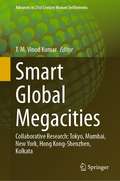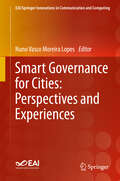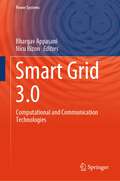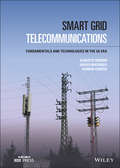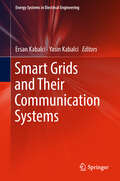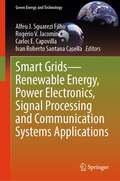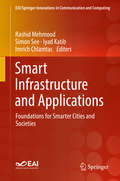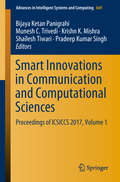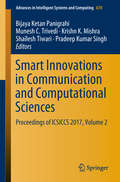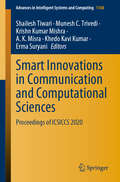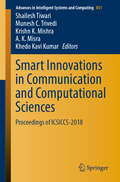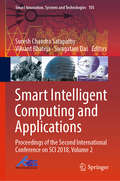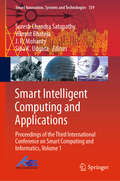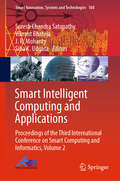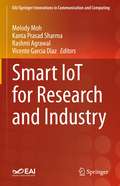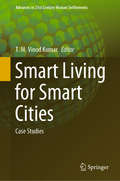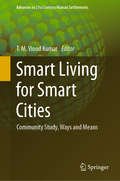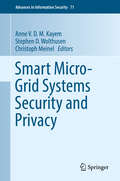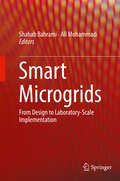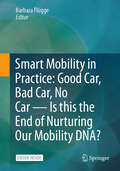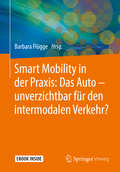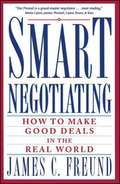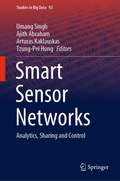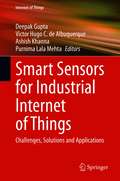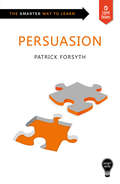- Table View
- List View
Smart Global Megacities: Collaborative Research: Tokyo, Mumbai, New York, Hong Kong-Shenzhen, Kolkata (Advances in 21st Century Human Settlements)
by T. M. Vinod KumarThis book, the first volume, highlights 8 out of a total of about 36 megacities in the World which by definition have 10 million inhabitants. The cities/chapters presented in this book are based on recent advance such as the wide use of ICT, IOT, e-Governance, e-Democracy, smart economy and flattening and acceleration of the world that is taking place in recent times as reported by 3 times Pulitzer Prize Winner Thomas Friedman. It therefor departs from other ideologies where only a certain megacity qualifies for the title of smart global megacities while in reality every megacity can, and presents how smart global megacities can be created.
Smart Governance for Cities: Perspectives and Experiences (EAI/Springer Innovations in Communication and Computing)
by Nuno Vasco Moreira LopesThis book provides theoretical perspectives and practical experiences on smart governance for smart cities. It presents a balanced linkage between research, policies and practices on this area. The authors discuss the sustainability challenges raised by rapid urbanization, challenges with smart governance models in various countries, and a new governance paradigm seen as a capable approach able to overcome social, economic and environmental sustainability problems. The authors include case studies on transformation, adaption and transfers; and country, regional, municipal contextualization. Also included are best practices on monitoring and evaluating smart governance and impact assessment. The book features contributions from researchers, academics, and practitioners in the field. Analyzes smart governance for cities from a variety of perspectives and a variety of sectors – both in theory and in practiceFeatures information on the linkage between United Nations Sustainable Development Goals and smart governanceCovers the connection between research, policies and practice in smart governance for smart cities
Smart Grid 3.0: Computational and Communication Technologies (Power Systems)
by Nicu Bizon Bhargav AppasaniThis book is the first on Smart Grid 3.0.The book presents literature reviews of recent computational and communication technologies and their application in the evolution of smart grids to Smart Grid 3.0. It offers new control solutions, architectures and energy management strategies that are based on artificial intelligence and deep learning techniques.The book details the hardware and software implementation of fault identification or detection based on synchrophasor data and machine learning. It also discusses blockchain architectures for smart grid applications such as electric vehicles, home automation and automatic metering infrastructure.
Smart Grid Telecommunications: Fundamentals and Technologies in the 5G Era (IEEE Press)
by Alberto Sendin Javier Matanza Ramon FerrusSMART GRID TELECOMMUNICATIONS Discover the foundations and main applications of telecommunications to smart grids In Smart Grid Telecommunications, renowned researchers and authors Drs. Alberto Sendin, Javier Matanza, and Ramon Ferrús deliver a focused treatment of the fundamentals and main applications of telecommunication technologies in smart grids. Aimed at engineers and professionals who work with power systems, the book explains what smart grids are and where telecommunications are needed to solve their various challenges. Power engineers will benefit from explanations of the main concepts of telecommunications and how they are applied to the different domains of a smart grid. Telecommunication engineers will gain an understanding of smart grid applications and services and will learn from the explanations of how telecommunications need to be adapted to work with them. The authors offer a simplified vision of smart grids with rigorous coverage of the latest advances in the field, while avoiding some of the technical complexities that can hinder understanding in this area. The book offers: Discussions of why telecommunications are necessary in smart grids and the various telecommunication services and systems relevant for them An exploration of foundational telecommunication concepts ranging from system-level aspects, such as network topologies, multi-layer architectures and protocol stacks, to communications channel transmission- and reception-level aspects Examinations of telecommunication-related smart grid services and systems, including SCADA, protection and teleprotection, smart metering, substation and distribution automation, synchrophasors, distributed energy resources, electric vehicles, and microgrids A treatment of wireline and wireless telecommunication technologies, like DWDM, Ethernet, IP, MPLS, PONs, PLC, BPL, 3GPP cellular 4G and 5G technologies, Zigbee, Wi-SUN, LoRaWAN, and Sigfox, addressing their architectures, characteristics, and limitations Ideal for engineers working in power systems or telecommunications as network architects, operations managers, planners, or in regulation-related activities, Smart Grid Telecommunications is also an invaluable resource for telecommunication network and smart grid architects.
Smart Grids and Their Communication Systems (Energy Systems In Electrical Engineering Ser.)
by Ersan Kabalci Yasin KabalciThe book presents a broad overview of emerging smart grid technologies and communication systems, offering a helpful guide for future research in the field of electrical engineering and communication engineering. It explores recent advances in several computing technologies and their performance evaluation, and addresses a wide range of topics, such as the essentials of smart grids for fifth generation (5G) communication systems. It also elaborates the role of emerging communication systems such as 5G, internet of things (IoT), IEEE 802.15.4 and cognitive radio networks in smart grids. The book includes detailed surveys and case studies on current trends in smart grid systems and communications for smart metering and monitoring, smart grid energy storage systems, modulations and waveforms for 5G networks. As such, it will be of interest to practitioners and researchers in the field of smart grid and communication infrastructures alike.
Smart Grids—Renewable Energy, Power Electronics, Signal Processing and Communication Systems Applications (Green Energy and Technology)
by Alfeu J. Sguarezi Filho Rogério V. Jacomini Carlos E. Capovilla Ivan Roberto Santana CasellaThis book discusses power electronics, signal processing and communication systems applications in smart grids (SG). Smart grids can be considered an evolution of the classic energy model to allow a more efficient management of the relationship between supply and demand, in order to overcome the contingency problems of the modern world. To achieve their goals, they use advanced technologies of information and communication, power electronics and signal processing, and can be used to integrate renewable energy sources.The book is divided into two main parts. The first part presents the application of power electronics technologies in renewable energy systems, while the second part presents some telecommunications, signal processing and energy capture technologies within the context of SGs. The chapters are written by invited expert authors, according to their research areas.
Smart Infrastructure and Applications: Foundations for Smarter Cities and Societies (EAI/Springer Innovations in Communication and Computing #224)
by Simon See Rashid Mehmood Iyad Katib Imrich ChlamtacThis book provides a multidisciplinary view of smart infrastructure through a range of diverse introductory and advanced topics. The book features an array of subjects that include: smart cities and infrastructure, e-healthcare, emergency and disaster management, Internet of Vehicles, supply chain management, eGovernance, and high performance computing. The book is divided into five parts: Smart Transportation, Smart Healthcare, Miscellaneous Applications, Big Data and High Performance Computing, and Internet of Things (IoT). Contributions are from academics, researchers, and industry professionals around the world. Features a broad mix of topics related to smart infrastructure and smart applications, particularly high performance computing, big data, and artificial intelligence; Includes a strong emphasis on methodological aspects of infrastructure, technology and application development; Presents a substantial overview of research and development on key economic sectors including healthcare and transportation.
Smart Innovations in Communication and Computational Sciences: Proceedings of ICSICCS 2017, Volume 1 (Advances in Intelligent Systems and Computing #669)
by Bijaya Ketan Panigrahi Krishn K. Mishra Shailesh Tiwari Munesh C. Trivedi Pradeep Kumar SinghThe book provides insights into International Conference on Smart Innovations in Communications and Computational Sciences (ICSICCS 2017) held at North West Group of Institutions, Punjab, India. It presents new advances and research results in the fields of computer and communication written by leading researchers, engineers and scientists in the domain of interest from around the world. The book includes research work in all the areas of smart innovation, systems and technologies, embedded knowledge and intelligence, innovation and sustainability, advance computing, networking and informatics. It also focuses on the knowledge-transfer methodologies and innovation strategies employed to make this happen effectively. The combination of intelligent systems tools and a broad range of applications introduce a need for a synergy of disciplines from science and technology. Sample areas include, but are not limited to smart hardware, software design, smart computing technologies, intelligent communications and networking, web and informatics and computational sciences.
Smart Innovations in Communication and Computational Sciences: Proceedings of ICSICCS 2017, Volume 2 (Advances in Intelligent Systems and Computing #670)
by Bijaya Ketan Panigrahi Krishn K. Mishra Shailesh Tiwari Munesh C. Trivedi Pradeep Kumar SinghThe book provides insights into International Conference on Smart Innovations in Communications and Computational Sciences (ICSICCS 2017) held at North West Group of Institutions, Punjab, India. It presents new advances and research results in the fields of computer and communication written by leading researchers, engineers and scientists in the domain of interest from around the world. The book includes research work in all the areas of smart innovation, systems and technologies, embedded knowledge and intelligence, innovation and sustainability, advance computing, networking and informatics. It also focuses on the knowledge-transfer methodologies and innovation strategies employed to make this happen effectively. The combination of intelligent systems tools and a broad range of applications introduce a need for a synergy of disciplines from science and technology. Sample areas include, but are not limited to smart hardware, software design, smart computing technologies, intelligent communications and networking, web and informatics and computational sciences.
Smart Innovations in Communication and Computational Sciences: Proceedings of ICSICCS 2020 (Advances in Intelligent Systems and Computing #1168)
by Shailesh Tiwari Munesh C. Trivedi A. K. Misra Khedo Kavi Kumar Krishn Kumar Mishra Erma SuryaniThis book presents the latest advances and research findings in the fields of computational science and communication presented at the International Conference on Smart Innovations in Communications and Computational Sciences (ICSICCS 2020). The areas covered include smart innovation; systems and technologies; embedded knowledge and intelligence; innovation and sustainability; advanced computing; networking and informatics. It also focuses on the knowledge-transfer methodologies and the innovation strategies employed to make these effective. This fascinating compilation appeals to researchers, academics and engineers around the globe.
Smart Innovations in Communication and Computational Sciences: Proceedings of ICSICCS-2018 (Advances in Intelligent Systems and Computing #851)
by Krishn K. Mishra Shailesh Tiwari Munesh C. Trivedi A. K. Misra Khedo Kavi KumarThe book presents the latest advances and research findings in the fields of computational science and communication. The areas covered include smart innovation; systems and technologies; embedded knowledge and intelligence; innovation and sustainability; advanced computing; and networking and informatics. It also focuses on the knowledge-transfer methodologies and the innovation strategies employed to make these effective. This fascinating compilation appeals to researchers, academics and engineers around the globe.
Smart Intelligent Computing and Applications: Proceedings Of The Second International Conference On Sci 2018, Volume 1 (Smart Innovation, Systems and Technologies #104)
by Swagatam Das Suresh Chandra Satapathy Vikrant BhatejaThe proceedings covers advanced and multi-disciplinary research on design of smart computing and informatics. The theme of the book broadly focuses on various innovation paradigms in system knowledge, intelligence and sustainability that may be applied to provide realistic solution to varied problems in society, environment and industries. The volume publishes quality work pertaining to the scope of the conference which is extended towards deployment of emerging computational and knowledge transfer approaches, optimizing solutions in varied disciplines of science, technology and healthcare.
Smart Intelligent Computing and Applications: Proceedings of the Third International Conference on Smart Computing and Informatics, Volume 1 (Smart Innovation, Systems and Technologies #159)
by J. R. Mohanty Suresh Chandra Satapathy Vikrant Bhateja Siba K. UdgataThis book gathers high-quality papers presented at the Third International Conference on Smart Computing and Informatics (SCI 2018–19), which was organized by the School of Computer Engineering and School of Computer Application, Kalinga Institute of Industrial Technology, Bhubaneswar, India, on 21–22 December, 2018. It includes advanced and multi-disciplinary research on the design of smart computing and informatics. Thematically, the book broadly focuses on several innovation paradigms in system knowledge, intelligence and sustainability that can help to provide realistic solutions to various problems confronting society, the environment, and industry. The respective papers offer valuable insights into the how emerging computational and knowledge transfer approaches can be used to deliver optimal solutions in science, technology and healthcare.
Smart Intelligent Computing and Applications: Proceedings of the Third International Conference on Smart Computing and Informatics, Volume 2 (Smart Innovation, Systems and Technologies #160)
by J. R. Mohanty Suresh Chandra Satapathy Vikrant Bhateja Siba K. UdgataThis book presents high-quality papers from the Third International Conference on Smart Computing and Informatics (SCI 2018−19), organized by the School of Computer Engineering and School of Computer Application, Kalinga Institute of Industrial Technology Deemed to be University, Bhubaneswar, from 21 to 22 December 2018. It includes advanced and multi-disciplinary research on the design of smart computing and informatics, focusing on innovation paradigms in system knowledge, intelligence and sustainability that have the potential to provide realistic solutions to various problems in society, the environment and industry. The papers featured provide a valuable contribution to the deployment of emerging computational and knowledge transfer approaches, optimizing solutions in varied disciplines of science, technology and health care.
Smart IoT for Research and Industry (EAI/Springer Innovations in Communication and Computing)
by Vicente Garcia Diaz Rashmi Agrawal Melody Moh Kanta Prasad SharmaThis book covers a variety of smart IoT applications for industry and research. For industry, the book is a guide for considering the real-time aspects of automation of application domains. The main topics covered in the industry section include real-time tracking and navigation, smart transport systems and application for GPS domains, modern electric grid control for electricity industry, IoT prospectives for modern society, IoT for modern medical science, and IoT automation for Industry 4.0. The book then provides a summary of existing IoT research that underlines enabling technologies, such as fog computing, wireless sensor networks, data mining, context awareness, real-time analytics, virtual reality, and cellular communications. The book pertains to researchers, outcome-based academic leaders, as well as industry leaders.
Smart Living for Smart Cities: Case Studies (Advances in 21st Century Human Settlements)
by T. M. Vinod KumarThis book, based on extensive international collaborative research, highlights the state-of-the-art design of “smart living” for metropolises, megacities, and metacities, as well as at the community and neighbourhood level. Smart living is one of six main components of smart cities, the others being smart people, smart economy, smart environment, smart mobility and smart governance. Smart living in any smart city can only be designed and implemented with active roles for smart people and smart city government, and as a joint effort combining e-Democracy, e-Governance and ICT-IoT systems. In addition to using information and communication technologies, the Internet of Things, Internet of Governance (e-Governance) and Internet of People (e-Democracy), the design of smart living utilizes various domain-specific tools to achieve coordinated, effective and efficient management, development, and conservation, and to improve ecological, social, biophysical, psychological and economic well-being in an equitable manner without compromising the sustainability of development ecosystems and stakeholders. This book presents case studies covering more than 10 cities and centred on domain-specific smart living components. The book is issued in two volumes. and this volume focus on city studies.
Smart Living for Smart Cities: Community Study, Ways and Means (Advances in 21st Century Human Settlements)
by T. M. Vinod KumarThis book, based on extensive international collaborative research, highlights the state-of-the-art design of smart living for metropolises, megacities, and metacities, as well as at the community and neighbourhood level. Smart living is one of six main components of smart cities, the others being smart people, smart economy, smart environment, smart mobility and smart governance. Smart living in any smart city can only be designed and implemented with active roles for smart people and smart city government, and as a joint effort combining e-Democracy, e-Governance and ICT-IoT systems. In addition to using information and communication technologies, the Internet of Things, Internet of Governance (e-Governance) and Internet of People (e-Democracy), the design of smart living utilizes various domain-specific tools to achieve coordinated, effective and efficient management, development, and conservation, and to improve ecological, social, biophysical, psychological and economic well-being in an equitable manner without compromising the sustainability of development ecosystems and stakeholders. This book presents case studies covering more than 10 cities and centred on domain-specific smart living components. The book is issued in two volumes and this volume focus on community studies and ways and means.
Smart Micro-Grid Systems Security and Privacy (Advances in Information Security #71)
by Christoph Meinel Anne V. Kayem Stephen D. WolthusenThis book is centered on Smart grids and micro-grids, as a cost-effective method of ensuring fair and equitable access to power in urban areas. It also considers scenarios where deploying smart grids can be both cost-prohibitively expensive and logistically challenging. Deploying smart microgrids instead, offers a reliable power solution but, as is the case in smart grids, a key issue is guaranteeing usability, trust, and reliability while protecting against energy theft. This book considers aspects such as state estimation, capacity planning, demand forecasting, price signals, and demand management with respect to energy theft. Straight-forward approaches to provoking energy theft on smart grids and micro-grids include mis-recordings power consumption/generation information and exposures of personally identifiable information or sensitive information. Attack models based on mis-recorded generation and/or consumption data and exposure of personally identifiable information, are also studied. In each case, countermeasures are proposed to circumvent the power theft attacks raised. Researchers in Smart Micro-grids security, cyber-physical systems, and critical infrastructure will want to purchase this book as a reference. Professionals, Researchers, Academics and students working in security general and Security of Critical Infrastructure, Privacy, and Data Sharing will also want to purchase this book as a reference.
Smart Microgrids: From Design to Laboratory-Scale Implementation
by Shahab Bahrami Ali MohammadiIn this book the authors first provide a comprehensive survey on the available studies on control, management, and optimization strategies in AC and DC microgrids. The authors then provide the design of a laboratory-scale microgrid system. Finally, a real-world implementation of the deigned framework is provided. This book paves the way for researchers working on the smart microgrids spread over the fields of electrical engineering, power systems, and smart infrastructures. Furthermore, it provides the readers with a comprehensive insight to understand an in-depth big picture of smart microgrids as well as an all-inclusive framework for laboratory-scale implementation of a microgrid. It is suitable for senior undergraduate students, graduate students who are interested in research in areas related to future smart grids and microgrids, and the researchers working in the related areas. This book also can be used as a reference book for researchers who want to develop laboratories on smart microgrids for future research.
Smart Mobility in Practice: Good Car, Bad Car, No Car – Is this the End of Nurturing Our Mobility DNA?
by Barbara FlüggeThis non-fictional, yet storytelling, book questions the role of cars and their impact, both for now and in the future. It is not enough to just consider autonomous driving, driving bans in Europe, and combustion engines. Our future and the future of our cities and country living depend on how we can coordinate different needs and different means. Finally, we ask ourselves: What is the status of the car today and in the future? Are we living and working in vehicles more than ever? And who benefits from autonomous driving and what are we giving up for it? In this book, the editor's work illustrates and critically assesses the role of cars. It showcases project examples and introduces easy to use checklists. The authors show how the car influences our business and private lives, and how the car stimulates our appetite for adventures, recreation, and survival. Emerging throughout more than a century, purposefully deployed, and innovativelyused, the automobile grew into our mobility DNA beyond horsepower and equipment. The car has been evolving into an adventure space, a survival and a growth space. The editor and authoring team present innovative services, digital use cases and smart data that are worth considering. The concept of Smart Mobility offers the possibility to retrieve the appropriate means of transport for individual and freight traffic in a forward-looking, digital, and intermodal way. Smart Mobility in practice: Good car, bad car, no car by DoktorB Barbara Fluegge and team is aimed at decision-makers and entrepreneurs, as well as project managers and their teams, in the context of smart city and digitail transformation projects. Numerous checklists and a comprehensive glossary make the book an important tool for practical use in pre- and post-preparation of projects and lectures in the field of Smart Mobility, Smart City, Smart Regions. Business Development and Digital Humanism.
Smart Mobility in der Praxis: Das Auto – unverzichtbar für den intermodalen Verkehr?
by Barbara FlüggeDie Zukunft der Städte und Ballungsräume hängt zunehmend davon ab, wie Verkehrsteilnehmer ihre unterschiedlichen Bedürfnisse koordinieren. Das Konzept der Smart Mobility bietet die Möglichkeit, die geeigneten Transportmittel für Individual- und Frachtverkehr vorausschauend, digital und intermodal abzurufen. Davon profitieren die Verkehrsteilnehmer, aber auch unser Ökosystem. Dieses Fachbuch wirft einen Blick hinter das Konzept einer durch Digitalisierung gestützten intelligenten Mobilität. Es illustriert Vorgehensweisen und Fragestellungen anhand von fiktiven wie realitätsnahen Projektierungsbeispielen in Städten und Regionen und behandelt zentrale Fragen: Wie lassen sich Mobilitätsszenarien ganzheitlich einschätzen und erfassen? Welches sind die wesentlichen Schritte, die es dabei zu berücksichtigen gilt?Das Einführungskapitel stellt das Konzept „Smart Mobility“ vor und erläutert verschiedene Projektierungsansätze sowie die Bausteine Intelligenter Mobilität (BIM). Zehn Fallbeispielen, unter anderem zum Autonomen Fahren, zu intelligenten Verkehrsknotenpunkten, zum Erlebnisraum Auto und der E-Mobilität, zeigen praxisnah, wie die Tools, Vorgehensweisen und BIM anzuwenden sind. Zahlreiche Checklisten und Abbildungen unterstreichen darüber hinaus den Praxisbezug dieses Werkes. Das Begleitbuch zu „Smart Mobility“ von Barbara Flügge, Digitalisierungsexpertin und Beraterin, richtet sich an Entscheider und Unternehmer sowie an Projektleiter und -mitarbeiter im Rahmen von Smart-City-Vorhaben. Außerdem eignet sich dieser Band ideal zur Vor- und Nachbereitung von Lehrveranstaltungen zu Themen wie Smart Cities oder Urban Systems Research.
Smart Negotiating: How To Make Good Deals In The Real World
by James FreundIf you've ever tried to make a deal, reach an agreement, close a sale, or negotiate in everyday business, Smart Negotiating shows you how to avoid the pitfalls and achieve your goals. James C. Freund is a skilled, seasoned lawyer who negotiates for a living, and the techniques he presents in Smart Negotiating have been proven effective in real-world bargaining situations. Freund emphasizes basic negotiating skills -- how to use leverage, how to get the information you need from the other side, how to build your own credibility, and the importance of good judgment. He then shows you how to design a winning game plan: how to develop realistic expectations on key issues, choose the right starting position, plan your concessions in advance, and anticipate the final agreement. Fresh, clever, practical -- and packed with vivid real-world examples -- Smart Negotiating will help anyone succeed at negotiating a deal.
Smart Sensor Networks: Analytics, Sharing and Control (Studies in Big Data #92)
by Ajith Abraham Tzung-Pei Hong Arturas Kaklauskas Umang SinghThis book provides IT professionals, educators, researchers, and students a compendium of knowledge on smart sensors and devices, types of sensors, data analysis and monitoring with the help of smart sensors, decision making, impact of machine learning algorithms, and artificial intelligence-related methodologies for data analysis and understanding of smart applications in networks. Smart sensor networks play an important role in the establishment of network devices which can easily interact with physical world through plethora of variety of sensors for collecting and monitoring the surrounding context and allowing environment information. Apart from military applications, smart sensor networks are used in many civilian applications nowadays and there is a need to manage high volume of demands in related applications. This book comprises of 9 chapters and presents a valuable insight on the original research and review articles on the latest achievements that contributes to the field of smart sensor networks and their usage in real-life applications like smart city, smart home, e-healthcare, smart social sensing networks, etc. Chapters illustrate technological advances and trends, examine research opportunities, highlight best practices and standards, and discuss applications and adoption. Some chapters also provide holistic and multiple perspectives while examining the impact of smart sensor networks and the role of data analytics, data sharing, and its control along with future prospects.
Smart Sensors for Industrial Internet of Things: Challenges, Solutions and Applications (Internet of Things)
by Deepak Gupta Ashish Khanna Victor Hugo C. de Albuquerque Purnima Lala MehtaThis book brings together the latest research in smart sensors technology and exposes the reader to myriad industrial applications that this technology has enabled. The book emphasizes several topics in the area of smart sensors in industrial real-world applications. The contributions in this book give a broader view on the usage of smart sensor devices covering a wide range of interdisciplinary areas like Intelligent Transport Systems, Healthcare, Agriculture, Drone communications and Security.By presenting an insight into Smart Sensors for Industrial IoT, this book directs the readers to explore the utility and advancement in smart sensors and their applications into numerous research fields. Lastly, the book aims to reach through a mass number of industry experts, researchers, scientists, engineers, and practitioners and help them guide and evolve to advance research practices.
Smart Skills: Persuasion (Smart Skills)
by Patrick ForsythPersuasion offers all you need to know to get the most out of your business operations. With the current global economic crisis excellent persuasion skills have become invaluable as businesses now more than ever must maximise every opportunity they face. Persuasion is not only required as part of negotiation, but in every aspect of working and business life. There are many different facets to persuasion and different approaches this book provides the details that will help you get ahead in the workplace. It is a fundamental skill and there are different facets and approaches. It is important to note that persuasion is not the same as negotiation, which is more geared towards a compromise or a degree of backing down. Rather persuasion is the power to convince the opposing party to your way of thinking either through means of influence, power or motivation. This book provides the details that will help you get ahead in the workplace.Key tactics to guarantee persuasivenessLanguage appropriate to persuasionStructure, sequence, visual aids, description Relating benefits to individuals - The tailored approachCredibility Avoid exaggeration & Avoid pressurising peopleAdd a demonstrationMaximising your chancesHandling and overcoming objectionsRespect alternative choicesDealing with “maybe”
